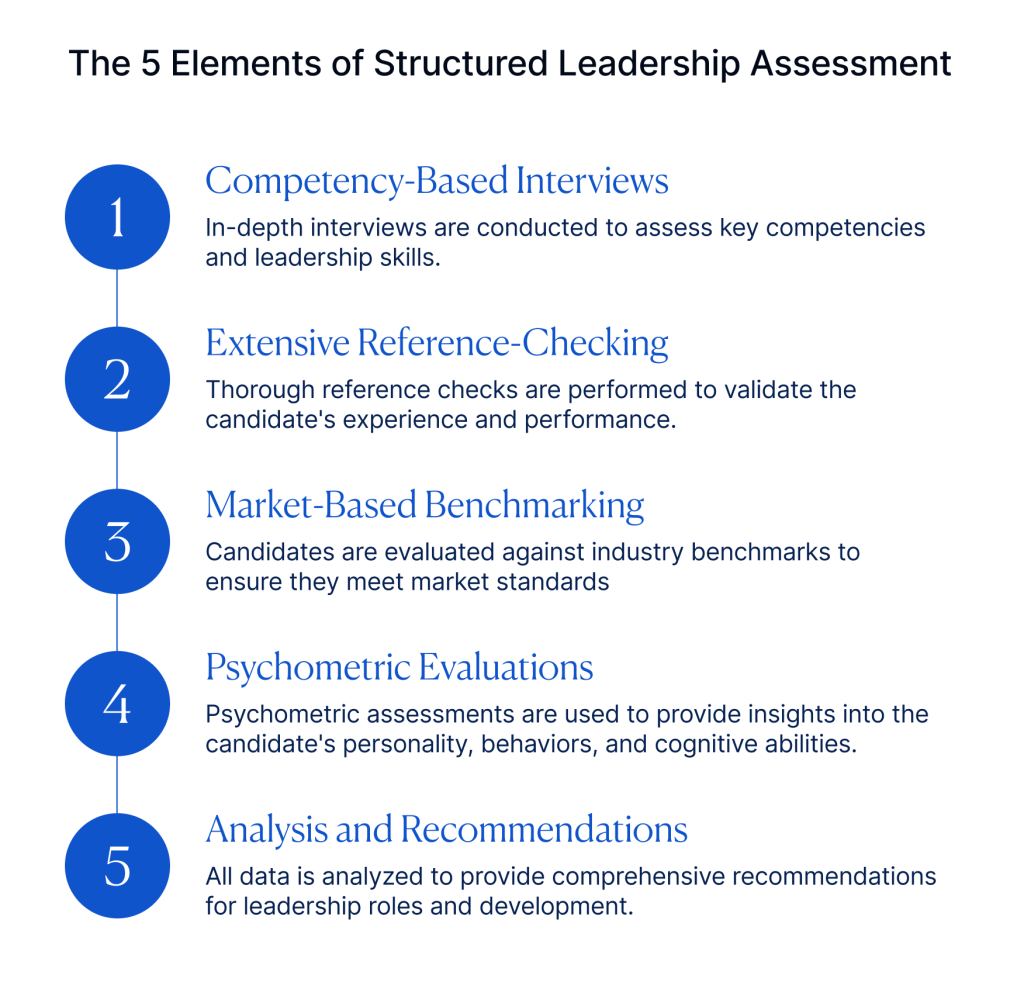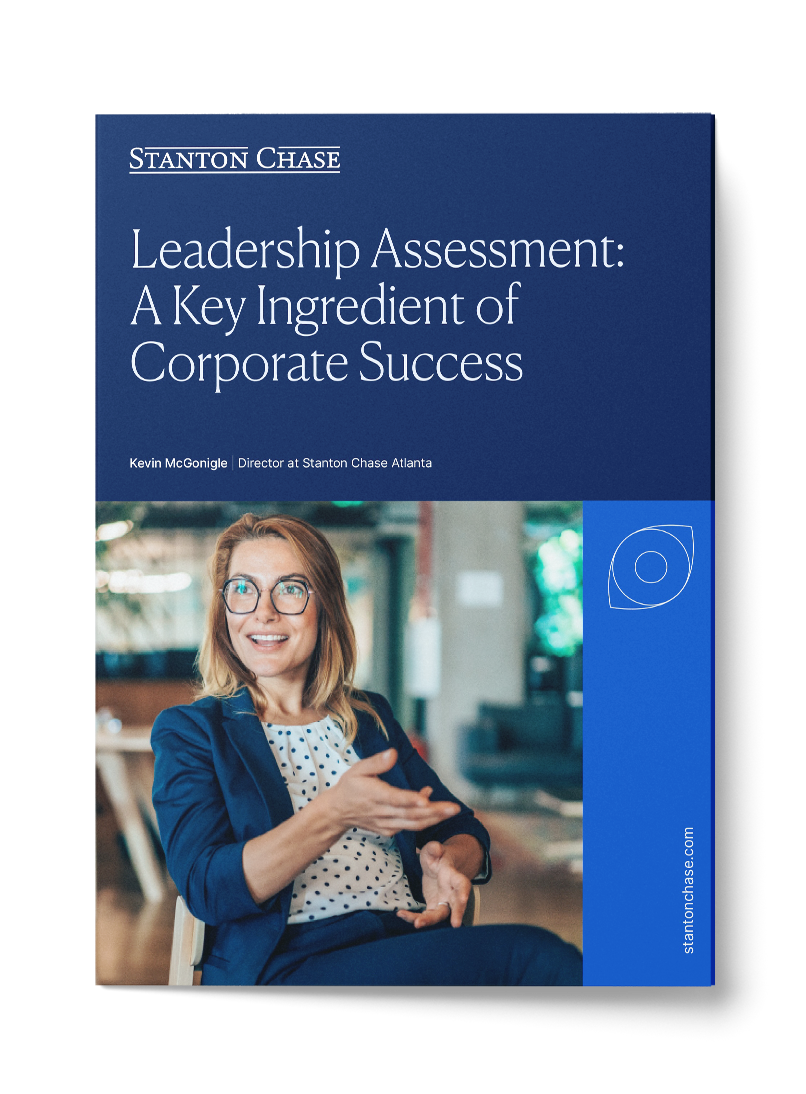
The competitive environment for businesses can be extremely challenging. Markets evolve rapidly; technology, regulations, and process innovations reframe the operating landscape at an incredible pace.
Companies must reinvent themselves, optimize their asset base, partner with others, and offer comparatively sophisticated products, or they face marginalization or elimination. Only the best survive and thrive.
To compound the situation, a tight labor market exists; companies heavily seek after the people who can design, implement, and manage rapid corporate changes, and these individuals can pivot to whichever company is best positioned to win competitively.
Why Do Companies Need Leadership Assessment?
In an environment where creativity, speed, and intellectual capital form the cornerstones of firms’ ongoing competitiveness, companies must understand and leverage the competencies of their executives.
Attracting, retaining, and developing high-caliber executives is paramount to the corporate equation. Companies need to ensure that the group leading their strategic and tactical moves consists of top-tier, market-leading executives.
Unfortunately, the development of comprehensive tools to objectively and rapidly catalogue and leverage executives’ competencies has not kept pace. Most organizations still rely on outdated modes of collecting and analyzing information; businesses’ operating practices, demands on executives, and the competitive landscape have morphed faster than the internal programs designed to capture, analyze, and leverage insights on critical management skills, development needs, and organizational alignment issues.
The dated ‘human capital’ assessment and development models do not work for today’s dynamic business environment. This has led to the emergence of leadership assessment.
What is Leadership Assessment?
Leadership assessment is ‘a structured, consistent, and competency-based process applied across a company’s leadership team.’ It evaluates human capital through an objective and comprehensive, skills-centered evaluative process and validates the conclusions with psychometric measurements and C-suite referencing. The findings are also ‘normalized’ against external benchmarks.

The assessment does not intend to judge executives’ self-worth. Instead, it determines whether an executive’s style and skills are compatible with the corporate and competitive realities. Since ‘value creation’ depends on how an individual’s competencies match the company’s specific issues and needs, evaluating executives on several competency-based dimensions highlights where they will ‘flourish and flounder.’ It is also possible to develop improvement plans to address highlighted shortcomings, which can include professional development or succession planning guidance. Leadership assessment should be transformative for the company.
What Does Leadership Assessment Offer That Internal Sources Cannot?
Frankly, leadership assessment has been attractive to many companies because it is fast, objective, insightful, and externally benchmarked. Replicating the exhaustive leadership assessment process with internal resources would be difficult.
Senior corporate executives (including HR and administration) must keep their companies operating. Their mandate is to deal with the many issues and processes that allow the corporation to function. It is imprudent for these senior-most executives to divert their attention from daily operating issues to undertake an all-consuming assessment, even if it only lasts a few weeks or months. Leveraging an external organization that singularly focuses on such work has proven to be the best path.
Leadership assessment also offers an apolitical vehicle for determining and presenting feedback. When handled properly, a consultancy has no political or organizational ‘sacred cows’ or fears of retribution from peers, so it can present unfiltered messages and evaluations. It is unrealistic to believe that internal executives could present critical assessments of their colleagues without some necessary watering-down or perceived tainting. Given the real and perceived dynamics of the corporate universe, a company can leverage an unbiased entity to drive the assessment.
What are the Broader Benefits of Leadership Assessment?
Given its structure and output, a leadership assessment has many ancillary benefits. Specifically, companies have used it to successfully:
- alter their managerial and cultural models to the competitive conditions;
- facilitate mergers and acquisitions by better understanding the human capital side of the deal;
- calibrate management against external benchmarks;
- coach, upskill, and align new executives; and
- identify, develop, and retain top talent.

When Should Companies Consider a Leadership Assessment?
Leadership assessment is commonly triggered by companies simply wanting to remain ‘current’ in evaluating their management team; approximately 30% of the industry’s assessments are now driven by clients that have incorporated leadership assessment into their regular executive evaluation process.
These companies recognize that the exhaustive leadership assessment process provides a comprehensive picture of the management resources, including the competency gaps and succession planning issues. Consequently, it speeds decision-making and enables benchmarking.
Regardless of whether it is being used for merger integration, corporate reorganization, or performance reviews, leadership assessment enables decisions that are predicated on proven competencies, not political maneuvering or outdated and misguided perceptions. Leadership assessment has therefore emerged as a central element of many companies’ evaluative processes.
Is Leadership Assessment a Customized Solution?
Stanton Chase’s market-proven methodology has been applied globally but is tailored to each specific client situation. The structure and deliverables remain essentially constant, but there is considerable effort dedicated to understanding the exact competencies, intricacies, and issues involved.
The assessment’s output must align with the client’s organizational, strategic, and cultural realities, so the Stanton Chase team ensures that this is ‘baked in’ from the outset. The specific competencies for, and structure of, the assessment are carefully evaluated to guarantee appropriateness.
It is also necessary that there be a defined path to leverage the learnings from the assessment. This means that discussions usually include how to provide executive-specific feedback, institute the required training and counseling, and effect any organizational movements to ensure that the company sees the full benefit that an assessment can provide.
Why Consider Stanton Chase for Your Next Leadership Assessment?
As one of the largest executive search and leadership advisory firms globally, Stanton Chase brings tremendous knowledge and skill through its partners. The firm has established itself as a leading player in leadership assessment, largely because it so adeptly leverages the resources, reach, and intellectual capital of its network.
Stanton Chase has a sophisticated methodology that combines competency-based interviews, extensive reference-checking, market-based benchmarking, and psychometric evaluations. Together, these various tools provide a well-substantiated, multi-faceted picture of each senior executive. The conclusions and recommendations flow directly from the individual assessments.
Find the Best Solution for Your Leadership Assessment Needs
Although it is still evolving, leadership assessment has become the preferred route for many successful organizations to identify and leverage the skills and competencies of their management team and calibrate it against “best in class” standards of executive leadership.
Leadership assessment has become the preferred route for many successful organizations.
From small, VC-backed entities to large multinationals, organizations are incorporating leadership assessment into their evaluative processes. Companies are compelled by leadership assessment’s role in helping to establish and sustain a competitive advantage by optimally leveraging their executives’ skills to conquer corporate challenges and generate marketplace victories.
Click here to reach out to one of our consultants and learn how we can help you find the best leadership assessment solution for your company’s needs.
About the Author
Kevin McGonigle is a Director at Stanton Chase Atlanta. Over his three-decade-long career, he has garnered extensive experience across various industries, including telecommunications, high tech, financial services, hospitality, consumer goods, and industrial. His career spans five continents and includes prominent Fortune 500 companies, private equity firms, and family-controlled businesses.
How Can We Help?
At Stanton Chase, we're more than just an executive search and leadership consulting firm. We're your partner in leadership.
Our approach is different. We believe in customized, personal, and fearless executive search, executive assessment, board services, succession planning, and leadership onboarding support.
We believe in your potential to achieve greatness and we'll do everything we can to help you get there.
View All Services
